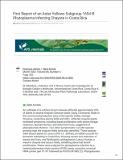Mostrar el registro sencillo del ítem
First Report of an Aster Yellows Subgroup 16SrI-B Phytoplasma Infecting Chayote in Costa Rica
| dc.creator | Villalobos Muller, William | |
| dc.creator | Moreira Carmona, Lisela | |
| dc.creator | Rivera Herrero, Carmen | |
| dc.creator | Bottner Parker, Kristi D. | |
| dc.creator | Lee, Ing-Ming | |
| dc.date.accessioned | 2018-11-13T16:08:43Z | |
| dc.date.available | 2018-11-13T16:08:43Z | |
| dc.date.issued | 2002-03 | |
| dc.identifier.citation | http://www.apsnet.org/publications/plantdisease/2002/March/Pages/86_3_330.3.aspx | |
| dc.identifier.issn | 0191-2917 | |
| dc.identifier.issn | 1943-7692 | |
| dc.identifier.uri | https://hdl.handle.net/10669/76111 | |
| dc.description.abstract | An outbreak of a witches' broom disease affected approximately 20% of plants in several chayote (Sechium edule (Jacq.) Schwartz) fields in the commercial production area of the Ujarrás Valley, Cartago Province, Costa Rica during 2000 and 2001. Affected chayote plants exhibited symptoms, including basal proliferation with severe foliage reduction, aborted flowers, and deformed fruits, suggestive of phytoplasmal infection. Two other symptomatic cucurbit species growing near the chayote fields were also identified. These species were tacaco plants (S. tacaco (Pitt.) C. Jeffrey), an edible cucurbit for domestic marketing in Costa Rica, showing severe size reduction of leaves and fruits, and Rytidostylis carthaginensis (Jacq.) Kuntze, a weed in chayote and tacaco fields, exhibiting abnormal tendril proliferation. Plants were analyzed for phytoplasma infection by a nested polymerase chain reaction (PCR) assay, using the universal rRNA primer pair P1/P7 followed by R16F2n/R16R2 (2). Phytoplasmas were detected in all symptomatic samples (18 chayote, 6 tacaco, and 3 weed) tested but were undetectable in all asymptomatic samples (10 chayote, 6 tacaco, and 2 weed). Restriction fragment length polymorphism (RFLP) analysis of PCR products (16S rDNA sequences) by separate digestion with eight restriction enzymes (RsaI, HhaI, KpnI, BfaI, HaeIII, HpaII, AluI, MseI) revealed that a phytoplasma belonging to subgroup 16SrI-B in the aster yellows phytoplasma group (16SrI) was associated with chayote witches' broom (CWB). The same or very similar phytoplasmas were found in both symptomatic tacaco and R. carthaginensis plants. Phylogenetic analysis of 16SrDNA sequences also confirmed the CWB phytoplasma to be most similar to members of subgroup 16SrI-B. Similar diseases in chayote and other cucurbits have been reported in Brazil (3), Taiwan (1), and Mexico (4). The CWB phytoplasma differs from the phytoplasma (16SrIII-J subgroup) associated with chayote in Brazil. The identities of phytoplasmas associated with cucurbits in Taiwan and Mexico are unknown. The occurrence of an aster yellows group phytoplasma in chayote may pose a potential threat to continued production and exportation of this cash crop. To our knowledge, this is the first report of 16SrI-B subgroup phytoplasmas in naturally infected cucurbits in Costa Rica. | es_ES |
| dc.description.sponsorship | Universidad de Costa Rica/[801-A5-582]/UCR/Costa Rica | es_ES |
| dc.description.sponsorship | International Atomic Energy Agency/[]/IAEA/Austria | |
| dc.language.iso | en_US | es_ES |
| dc.rights | Attribution-NonCommercial-NoDerivatives 4.0 Internacional | * |
| dc.rights.uri | http://creativecommons.org/licenses/by-nc-nd/4.0/ | * |
| dc.source | Plant Disease, vol. 86(3), pp. 330 | es_ES |
| dc.subject | Fitoplasmas | es_ES |
| dc.subject | Enfermedades de chayote | es_ES |
| dc.subject | Enfermedades del tacaco | es_ES |
| dc.subject | 635.6 Frutas y semillas hortícolas comestibles | es_ES |
| dc.title | First Report of an Aster Yellows Subgroup 16SrI-B Phytoplasma Infecting Chayote in Costa Rica | es_ES |
| dc.type | artículo original | |
| dc.identifier.doi | 10.1094/PDIS.2002.86.3.330C | |
| dc.description.procedence | UCR::Vicerrectoría de Investigación::Unidades de Investigación::Ciencias Básicas::Centro de Investigación en Biología Celular y Molecular (CIBCM) | es_ES |
| dc.identifier.codproyecto | 801-A5-582 |
Ficheros en el ítem
Este ítem aparece en la(s) siguiente(s) colección(ones)
-
Agronomía [1485]



